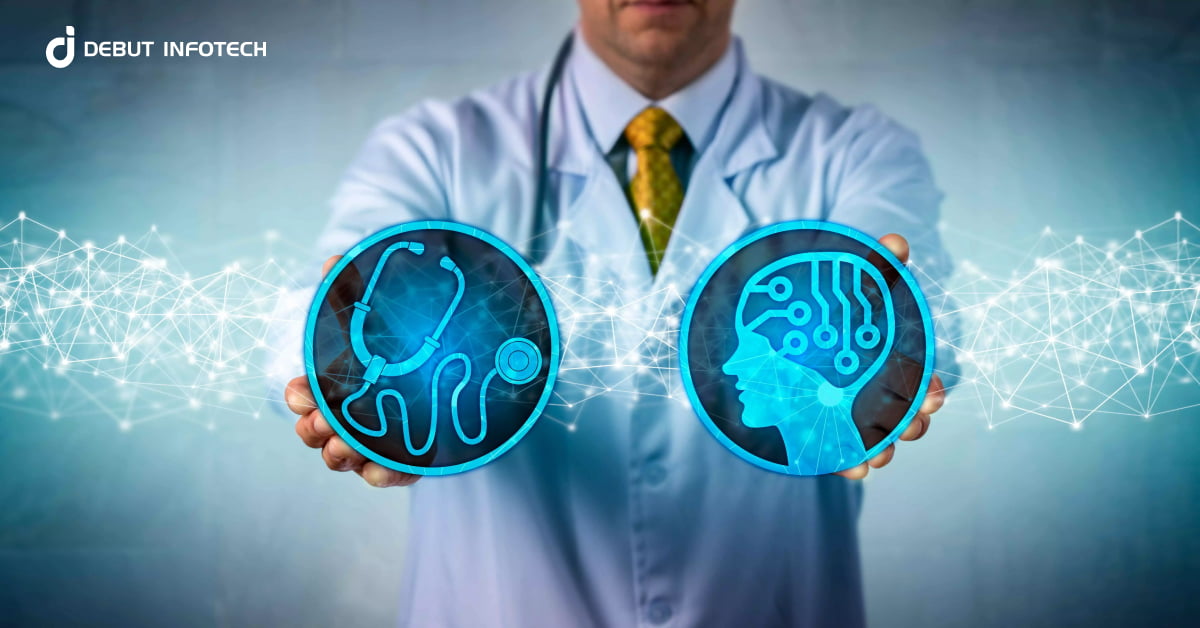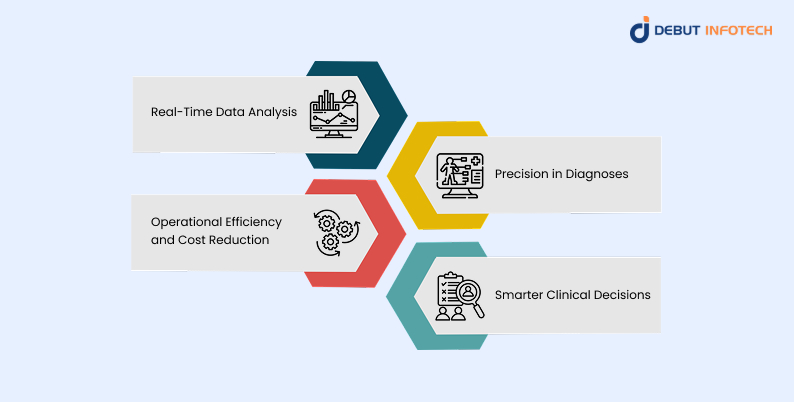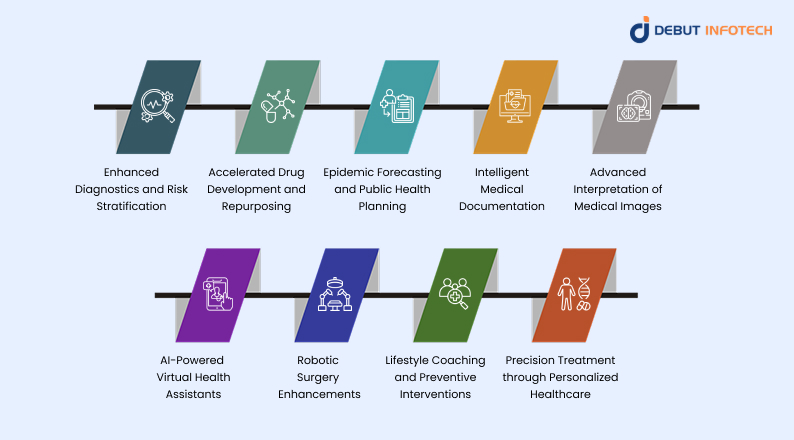Table of Contents
Home / Blog / Artificial Intelligence
Understanding Machine Learning Healthcare Applications
May 19, 2025

May 19, 2025
According to the World Health Organization, it is projected that the healthcare industry will experience a shortage of 10 million health workers by 2030. This poses a major issue which machine learning shows promise to resolve.
Systems which leverage machine learning technology can analyze vast datasets and detect patterns to make decisions autonomously without much human assistance. Instead of following programmed instructions, ML algorithms process data to reveal insights which go beyond human observations. In an industry like healthcare, where there is continuous flow of data from electronic health records and diagnostic images, machine learning healthcare applications are highly valuable.
So what drives the enormous rise of AI and machine learning applications in healthcare? What specific applications and use cases does machine learning offer to the healthcare field? Which machine learning trends should businesses adopt from machine learning technology for their healthcare operations?
Let us find out answers to all such questions in the blog below.
What is Machine Learning in Healthcare?
The healthcare industry is experiencing a major transformation through machine learning integration, speeding up innovation in clinical management, pharmaceutical advancement and surgical techniques development. Most notably, it improves disease diagnosis accuracy which results in reduced emergency room visits and hospital readmissions.
Through the analysis of data from sources like satellite, social media, news outlets and video content, machine learning applications in healthcare can determine either treatable or potentially fatal illnesses. The transformative nature of this technology, supported by advancements in deep learning in predictive analytics, enables healthcare professionals to concentrate on providing optimum treatment and patient care while eliminating their need to handle data.
In other words, the healthcare sector has emerged as a leading beneficiary of AI and machine learning technologies through which they establish new superior standards for treatment quality and operational efficiency.
Boost Healthcare Outcomes with ML
Machine Learning is redefining patient care—boosting early disease detection accuracy by 85%, predicting patient deterioration, and enabling personalized treatment plans.
Benefits of Machine Learning in Healthcare
Modern healthcare is experiencing a revolution through machine learning which enables advanced diagnostic capabilities, personalized treatments and optimized system efficiencies. Medical institutions use this technology to transform the way healthcare workers provide care services. Here are some of the major benefits:

1. Real-Time Data Analysis
Smart medical devices with built-in sensors automatically collect patient information that machine learning models instantly analyze and interpret. This enables healthcare providers to identify rapidly any indicators that deviate from standard health parameters.
Machine learning in healthcare examples, such as wearable sensors or predictive algorithms, rely on advanced machine learning techniques to analyze trends and deliver timely interventions for patients. Through AI implementations in neonatal intensive care units, healthcare providers can identify warning signs from premature infants which enables them to respond more quickly.
2. Operational Efficiency and Cost Reduction
Through automation of regular administrative work and clinical responsibilities machine learning in healthcare enables healthcare facilities to function better and diminish operational expenses.
The implementation of ML systems enables the automation of tasks such as physician note transcription, insurance claim verification, hospital inventory management which reduces both human workload and errors. For example, medical reports benefit from natural language processing (NLP) tools which transform voice inputs into structured reports leading to enhanced record accuracy and time efficiency.
3. Precision in Diagnoses
Machine Learning Models analyze extensive medical data which includes diagnostic images and laboratory tests to detect disease indicators with remarkable accuracy. This is especially valuable in diagnosing conditions that may present subtly or develop rapidly.
AI models trained through thousands of retinal images perform earlier detection of diabetic retinopathy symptoms better than conventional screening techniques do. Similarly, Artificial intelligence tools designed for neurology minimize the delay in Alzheimer’s disease detection by analyzing brain images to identify warning signs early.
4. Smarter Clinical Decisions
Machine learning provides healthcare providers with data-driven support by analyzing patient histories, treatment outcomes and genetic information to help them make informed decisions.
For example, predictive models evaluate a patient’s risk of returning to healthcare facilities after discharge and forecasting their medication responses. Hospitals employ these data insights to personalize care plans, reduce avoidable readmissions and enhance patient care satisfaction.
Applications of Machine Learning in Healthcare
Machine learning is revolutionising healthcare, enabling machine learning platforms, intelligent tools and systems that enhance healthcare services and increase operational efficiency. The following are compelling real-world applications that showcase just how machine learning is changing the medical terrain.

1. Enhanced Diagnostics and Risk Stratification
Machine learning for healthcare applications improves diagnostic accuracy through analysis of large patient data sets to identify subtle signs and patterns that can easily go unnoticed by humans. These systems are capable of classifying people by risk levels so as to initiate early intervention for those who are prone to stroke or diabetic complications.
For instance, systems like Google’s DeepMind Health scans through the eyes to identify early disease symptoms related to diabetic retinopathy and age-related macular degeneration. This enables clinicians to prioritize care and prevent symptoms before they reach critical levels.
2. Accelerated Drug Development and Repurposing
It takes years of research and much money to come up with new drugs. Machine learning accelerates this process because it predicts molecular interactions, side effects and success probabilities. For instance, machine learning development companies like Atomwise utilize deep learning for predicting interaction of various chemicals with target proteins, ensuring quicker identification of viable drug candidates. Not only does it shorten development time frames, but it also paves the way for existing drugs to find new use for new treatment.
3. Epidemic Forecasting and Public Health Planning
Machine learning models, particularly those in healthcare machine learning, can observe trends in mobility, climate, and population health data to predict and trace the spread of infectious diseases. BlueDot, a Canadian startup, used AI to detect the emerging threat of COVID-19 before it made the news. Such systems not only enable rapid responses from health authorities but also align with machine learning in Business Intelligence, ensuring efficient resource allocation and targeted interventions during public health crises.
4. Intelligent Medical Documentation
The management of medical records usually involves a lot of work and high chances of errors. Natural language processing (NLP) and handwriting recognition facilitates this process. Tools like Suki’s AI assistant, powered by machine learning for medicine, listen to physician dictations and write structured clinical notes, which saves hours of administrative work. This innovation not only improves documentation accuracy but also highlights the growing role of NLP in Business applications, bridging gaps between healthcare efficiency and scalable technological solutions.
5. Advanced Interpretation of Medical Images
The interpretation of medical images such as PET scan or ultrasound requires accuracy. Medical machine learning models that have been trained on annotated datasets can pick the tiniest of anomalies, like early-stage tumors or internal bleeding. For instance, the AI technology applied in Aidoc helps radiologists in identifying the important short term abnormalities and increases the efficiency and accuracy of the diagnosis. Such innovations, often powered by machine learning development services, prevent delays in diagnostics and assist in reducing human error in critical settings.
6. AI-Powered Virtual Health Assistants
Virtual Health Assistants use ML in healthcare to provide 24/7 support, with focuses on chronic condition management and follow-up appointments. For instance, HealthTap’s AI assistant enables answering health-related queries, reminding patients about medication, and setting follow-ups. These systems evolve with time in order to respond to the needs of the patients, for example, by changing manners of engaging the patients to ensure they stick to the recommended treatment plans and avoid frequent visits to health facilities.
7. Robotic Surgery Enhancements
Machine learning is changing the way that robots assist surgeons by acting as a learning tool for enhancing the effectiveness of operations. For example, the da Vinci Surgical System is equipped with machine learning algorithms and helps facilitate complex surgeries, including prostatectomies or gynaecological surgeries. These robots improve the level of accuracy in operations, shorten the recovery period, and help to reduce the number of side effects of surgery by being programmed to draw experience from past operations.
8. Lifestyle Coaching and Preventive Interventions
Machine learning can assist in proactive health management since the detection of certain behavioral patterns helps in providing certain recommendations. Apps such as Noom utilize AI in controlling the behavior of their users and providing psychological coaching to ensure weight loss and healthier behavior showcasing key ai ml use cases in healthcare. These systems learn from feedback based on users’ interaction, and encourage continued changes that would lead to the reduction of obesity, hypertension, and type 2 diabetes and similar diseases in the long-run.
9. Precision Treatment through Personalized Healthcare
By making use of data from electronic health records, genomics, and lifestyle information, machine learning enables healthcare providers to offer personalized treatments. Techniques like supervised learning vs unsupervised learning are critical here: supervised models predict outcomes using labeled datasets (e.g., therapy success rates), while unsupervised methods uncover hidden patterns in unlabeled genomic or behavioral data. Tempus, a technology company, employs machine learning to analyze molecular and clinical data in cancer patients to pinpoint the effective therapy options. With the growing availability of health data, machine learning will assume a critical role in determining effective patient-specific treatments.
Challenges of Implementing Machine Learning in Healthcare
Despite the establishment of promising healthcare advancements with the use of ML algorithms, it is essential to know that there are other substantial risks and constraints of utilizing ML in healthcare that is worth considering:
1. Algorithmic Bias
Machine learning models rely on the training data, and if diverse data is not included then the models will have adverse effects, most especially when it comes to underrepresented groups in the society. This can result in misdiagnosis or biases in treatment. Algorithmic bias underscores a core issue in machine learning challenges, as human error in data collection or labeling is amplified by algorithms, therefore, the use of diverse datasets and strict validation procedures should be employed.
2. Data Limitations
For the success of machine learning for healthcare, it is highly essential to have clean, structured, and diverse datasets. However, healthcare data is often fragmented, inconsistent and hard to access on account of privacy issues and incompatibility of systems. These limitations affect the training of models and significantly limit the use of ML solutions in clinical contexts.
3. Privacy and Security Concerns
Due to the increased use of patient data, machine learning healthcare systems are extremely vulnerable to privacy and security concerns regarding patient data and regulatory compliance. To maintain patient trust and safety, organizations need to implement potent measures like encryption, secure storage, and compliance with standards like HIPAA. Partnering with reputable machine learning consulting firms ensures alignment with best practices and organizational integrity for data security.
4. Lack of Strategic Planning
The integration of the application ML into the environment of healthcare can be disruptive if there is no plan. The lack of proper planning can lead to staff resistance and insufficient adoption. The successful implementation can only be achieved when the technical solutions are integrated with the organizational structures and functions supported by leadership and cross-functional collaboration. Engaging specialized machine learning development companies can bridge gaps in strategy and execution.
5. Limited In-House Expertise
Applying healthcare and machine learning solutions requires a fairly unique combination of data science and clinical knowledge. Many organizations either don’t have medical input when developing or technical know-how in clinical teams resulting in solutions that don’t have any real world application. Closing this gap requires hybrid teams of clinicians and ML experts, or partnering with an AI development company to accelerate innovation.
The Road Ahead for Machine Learning in Healthcare
The future of machine learning in the field of healthcare is very bright. Yes, there are still many issues that have not been solved in healthcare, however, with the help of ML, existing difficulties are solved and future ones are prevented, such as the spread of diseases around the world in a pandemic. It also aids in the better patient care, refining of clinical practices as well as developing and adjusting clinical and pharmaceutical practices.
It is particularly effective in handling large and varied data, deciding on patient care, risk and prognosis, and performing various other functions. ML and artificial intelligence (AI) are, in particular, being very useful in early warnings for critical conditions such as seizures and sepsis, which require complex analyses of complex data patterns and align with Key Trends in NLP for interpreting unstructured clinical notes.
In future, more collaborations between the fields of ML and nanotechnology are anticipated to enhance drug delivery systems. It could also open the door for other developments such as “virtual biopsies” and radiomics. By using ML tools, healthcare workers can carry out operations with greater accuracy and less danger. This time, we may even observe intelligent robots being handy as the surgeons near the operating room. In time, we may also see intelligent robots assisting surgeons in the operating room.
AI has potential benefits for doctors and clinicians, researchers, as well as patients. Every technological breakthrough brings new applications that are relevant to real world healthcare challenges or promotes significant improvements. As this field develops, the role of ML in healthcare will expand even further.
ML Reduces Clinical Trial Errors by 40%—Ready to Harness It?
Turn patient data into precision care. Our healthcare AI specialists design, train, and deploy models that comply with regulations while delivering faster diagnoses and better outcomes. Let’s build solutions that heal.
Harness the Power of Machine Learning with Debut Infotech
Machine learning is revolutionizing the healthcare sector, delivering better, quicker, and more individualized treatment. For the healthcare organizations that want to be at the forefront of machine learning and healthcare, collaboration with the right development team is essential. Debut Infotech has years of experience in developing innovative healthtech solutions that meet the needs of the industry.
From predictive analytics and intelligent automation to personalized treatment planning, our applications of machine learning are tailor-made to solve the operational and clinical problems which healthcare providers encounter. We specialize in using real-time data from IoT-enabled devices, enhancing diagnostic accuracy through advanced imaging analysis, and streamlining clinical trial processes while maintaining strict regulatory and security standards.
At Debut Infotech, we don’t just implement technology, we make healthcare organizations achieve more, spend less, and treat patients in the best possible way. The future of care is data-driven and intelligent. Let us help you lead the way.
Frequently Asked Questions (FAQs)
Q. What ways is machine learning utilized in healthcare for predicting and diagnosing diseases?
A. AI enhances decision-making, improves workflow efficiency, and automates various healthcare processes. Through machine learning, clinicians can identify irregularities during triage and prioritize urgent, high-risk patients for immediate care.
Q. Do hospitals utilize machine learning?
A. Yes, machine learning enables medical professionals to gather and manage patient data, detect healthcare trends, and suggest appropriate treatments.
Q. How does AI minimize human error in healthcare?
A. By tackling challenges such as fatigue, information overload, and communication breakdowns, AI serves as a reliable support system, allowing healthcare professionals to focus more effectively on critical decision-making.
Q. How does machine learning contribute to medical diagnosis?
A. Artificial intelligence supports decision-making, streamlines workflows, and automates tasks. Healthcare providers utilize advanced machine learning in triage to detect abnormalities and prioritize critical cases.
Talk With Our Expert
Our Latest Insights
USA
Debut Infotech Global Services LLC
2102 Linden LN, Palatine, IL 60067
+1-708-515-4004
info@debutinfotech.com
UK
Debut Infotech Pvt Ltd
7 Pound Close, Yarnton, Oxfordshire, OX51QG
+44-770-304-0079
info@debutinfotech.com
Canada
Debut Infotech Pvt Ltd
326 Parkvale Drive, Kitchener, ON N2R1Y7
+1-708-515-4004
info@debutinfotech.com
INDIA
Debut Infotech Pvt Ltd
Sector 101-A, Plot No: I-42, IT City Rd, JLPL Industrial Area, Mohali, PB 140306
9888402396
info@debutinfotech.com



Leave a Comment